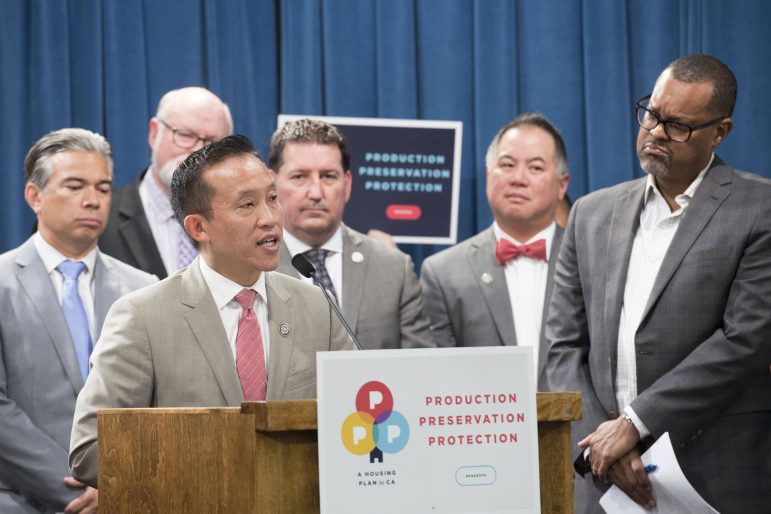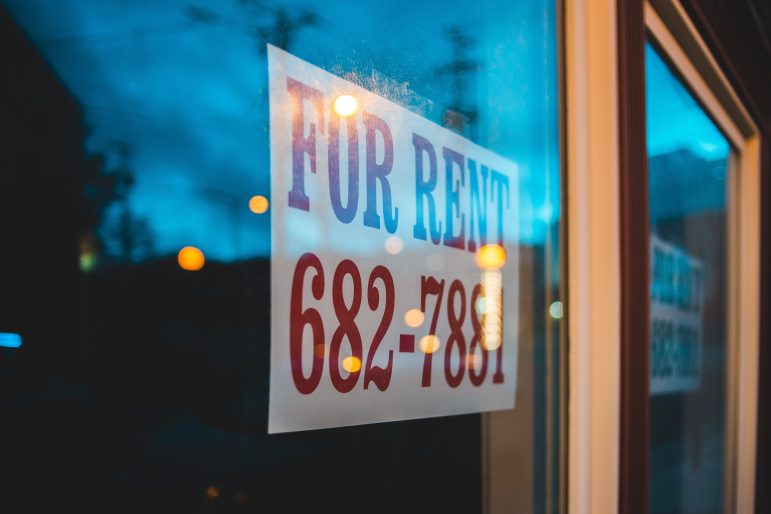Roughly 20 percent of renter households in California are behind on rent payments, with low-income residents and people of color being hardest hit, according to new research by the Bay Area Equity Atlas.
Since last March, when the COVID-19 pandemic began to surge across the country and local and state governments implemented stay-at-home measures in an attempt to slow its spread, about 1.1 million California households have fallen behind on rent, according to the report released Thursday.
During that time, average estimated rent debt per renter household ballooned to $3,400 and the total rent debt across the state stands at about $3.7 billion, according to “The Coming Wave: COVID-19 Evictions,” which tracks county- and state-level data.
“There’s a policy debate happening right now about what do we do to prevent an eviction tsunami in California and its critical to know the extent of the challenge to properly address that potential humanitarian crisis,” said Sarah Treuhaft, vice president of research at PolicyLink, which manages the Bay Area Equity Atlas in partnership with the USC Equity Research Institute and the San Francisco Foundation.
“These estimates should inform the allocation of public resources to both prevent eviction and remedy rent debt that’s accrued,” Treuhaft said. “It’s not only about preventing eviction itself, but what we see with this data is that households that are behind on rent are significantly behind, thousands of dollars behind, and that debt is wreaking havoc on family finances.”

The report also shows the rent-debt burden is disproportionately borne by low-income renters and people of color, with 32 percent of low-income renter households having fallen behind on payments while Latino, black and Asian renters are two to three times as likely to be behind as white renters.
“It’s all about the pandemic and who was exposed to the economic crisis of the pandemic,” Treuhaft said.
PolicyLink and its allies, including the Housing Now coalition and Tenants Together, are hoping the new numbers will encourage the state Legislature to pass additional renter protections, including Assembly Bill 15, which would extend the current eviction moratorium through 2021 and allow local governments to pass more protective measures.
Assemblyman David Chiu, D-San Francisco, author of the existing moratorium legislation as well as AB 15, said negotiations over the extension are likely to continue around the clock in an effort to hammer out a deal by the time the existing protections expire on Feb. 1.

“Countless Californians are staring at an eviction cliff if we don’t extend this by Jan. 31,” Chiu said Thursday afternoon as he was headed into talks over the fate of AB 15.
Negotiations appear to be focused on how long the eviction moratorium would last, whether local governments can implement stronger protections and how to prevent landlord retaliation over pandemic-related nonpayment, among other things.
If no deal materializes, people who aren’t able to pay 25 percent of back rent that’s accumulated between last September and the end of this month or who can’t pay February’s rent could face eviction in the midst of a pandemic that, as of Thursday, has infected more than 3 million Californians and killed 35,004.
“The consensus is still being hammered out but all of my colleagues appreciate how dire the situation is,” Chiu said. “The devil is the in details and we’re still working it out.”
In addition to wrangling over AB 15, lawmakers and advocates are also trying to figure out how best to allocate $2.6 billion in federal stimulus money sent to California to help struggling tenants and landlords, Chiu said.
Landlord groups are demanding that any extension of the eviction moratorium also include help for landlords who are struggling to keep their heads above water while rents are withheld.
Officials with the California Apartment Association also say federal aid needs to be disbursed quickly, that tenants who can pay rent should be required to do so, that local governments should not be allowed to craft separate eviction moratoriums, and that a solution should be found for tenants who can’t pay rent but who also don’t qualify for federal relief.
“No other private industry has been asked to provide a product or service for free for over a year. Tenants have been protected, now it’s time to help property owners who have done their part,” said CAA Executive Vice President Debra Carlton.
Tenant advocates hope the new rent debt estimates, which differ significantly from those released this week by the California Legislative Analyst’s Office, will encourage lawmakers to pass comprehensive protections.
The LAO’s Tuesday report estimates that just 2 percent of California’s renter households are behind an average of $4,500 for a total of $400 million in debt.
Those numbers are based on Federal Reserve Bank of Philadelphia data and adjusted for government efforts to provide income, mortgage and rental assistance along with increased unemployment benefits.

The Bay Area Equity Atlas figures are based on U.S. Census Pulse surveys estimating that between 10 percent and 20 percent of the state’s renters have been behind on rent since September, Treuhaft said.
“We have seen a number of estimates on this topic. Many of the estimates are closer to the much larger, incredibly disturbing numbers we have seen,” Chiu said. “It’s clear that while many California renters have been able to pay their rent, there is a sizeable number who can’t.”
